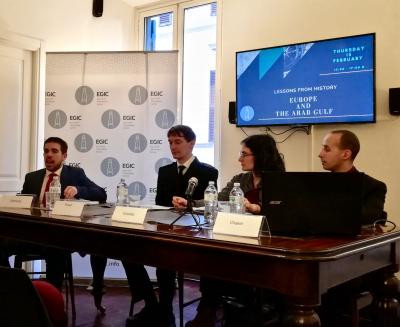Gulf's growing Med power and human rights at EGIC

ROME – Human rights, the growing power of the Arab world in the Mediterranean and the challenges for future relationships between Europe and the Gulf were the central themes of three talks at the Euro-Gulf Information Centre (EGIC) by Dr Silvia Colombo, Dr Gerald Power and Dr Rachid Chaker as part of the Centre’s “Lessons from History” series.
Dr Colombo of the Istituto Affari Internazionali spoke first on the tensions that have hindered European Union and Gulf Cooperation Council (GCC) relations in the years since the latter’s foundation in 1981 to represent the joint interests of Bahrain, Kuwait, Oman, Qatar, Saudi Arabia and the United Arab Emirates.
These relations, she argued, had always struggled against the individual interests of member states in both regions, especially given the history of colonial ties and the informal backchannels that existed between nations.
However, she also noted that diplomacy between the areas had changed drastically in recent years, following Europe’s economic crash and the Arab Spring. The former led to a number of EU countries, primarily Italy and Spain, being bailed out by sovereign wealth funds in the Gulf. The latter, turning Arab states inwards to address domestic issues and protests.
This was followed by Dr Power’s talk exploring the implications of the United Kingdom’s withdrawal from East of Suez in 1968, not only on present-day relations between the country and the Gulf, but also the wider problems surrounding the UK’s Brexit vote.
Dr Power, from the Metropolitan University of Prague, highlighted that while Britain’s military withdrawal may have become increasingly inevitable in the course of the 1960s, it was also mishandled by the Labour government, who rushed through the decision to the detriment of the country’s interests and status in the Gulf.
Britain’s decision to leave the Gulf was never as final as had been suggested, with the Navy and police remaining in many countries and indeed, changing their function from defenders to state-builders assisting Gulf nations. Such an outcome, Dr Power contended, pointed to the dangers of short-termism for the UK’s future diplomacy in Europe and the Gulf.
The final talk came from Dr Chaker of the Universite Pantheon-Assas Paris. Turning his attention to France’s relations with the Gulf, Dr Chaker argued that more had to be done to improve the Gulf’s image in France where it is frequently conflated with terrorism and the dangers of globalisation.
He noted that a recent poll conducted in France found that 84 percent of the population had a negative view of Qatar, the Gulf state with the greatest media presence in France following the high-profile purchase of Paris Saint-Germain football club and the tax convention signed between the two countries.
The perception that France is “for sale” in the Gulf has to be challenged, Dr Chaker affirmed, with academics needing to do more to contest the conflation of Islamist terror and foreign relations, as happened in 2015 when the French Senate suddenly scrapped a deal with Qatar following the attacks in the country.
How then, were European nations to balance pursuing their interests in the Gulf with a commitment to human rights?
Dr Chakar answered the Insider by arguing that “France is the country of human rights” and that they should “continue to ask for the respect of human rights.” However, he suggested that the issue was unlikely to be a “pillar of France’s priorities going forward… I think jobs and economic growth are more important.”
On a more optimistic note, Dr Colombo suggested that “interests and values shouldn’t be placed against each other again and again.” “These two objectives,” she proposed, “are not incompatible” noting that the EU could “apply the same standards that it adopts internally to business and trade relations” with the Gulf.
tw


